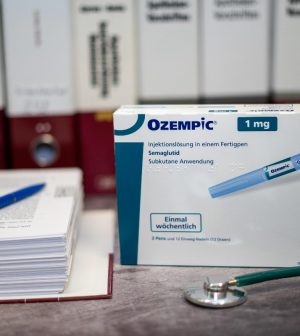- Could Your Grocery Store Meat Be Causing Recurring UTIs?
- Are You Making This Expensive Thermostat Error This Winter?
- Recognizing the Signs of Hypothyroidism
- 10 Strategies to Overcome Insomnia
- Could Artificial Sweeteners Be Aging the Brain Faster?
- Techniques for Soothing Your Nervous System
- Does the Water in Your House Smell Funny? Here’s Why
- Can a Daily Dose of Apple Cider Vinegar Actually Aid Weight Loss?
- 6 Health Beverages That Can Actually Spike Your Blood Sugar
- Treatment Options for Social Anxiety Disorder
Study Finds Big Shift in Who’s Using GLP-1 Meds Like Ozempic

The boom in using GLP-1 drugs like Ozempic to treat obesity has resulted in a bust regarding the drugs’ original purpose, which was to treat type 2 diabetes, a new study finds.
New prescriptions for these drugs have doubled among people who have obesity but not diabetes, investigators found.
As a result, drug shortages have triggered a drop in new prescriptions for type 2 diabetes, even though Ozempic and Mounjaro were initially developed as diabetes drugs, the researchers said.
Both drugs were later approved for weight loss under different brand names, Wegovy and Zepbound.
“Essentially, after the medication was approved for obesity… use took off so quickly that we lost control and vision of how fast people were picking up these medications,” said lead researcher Dr. Ali Rezaie, medical director of the Cedars-Sinai GI Motility Program.
For the study, researchers analyzed the medical data of about 45 million Americans between 2011 and 2023.
About 1 million people became new GLP-1 users during that period in time, results show. Researchers classified them based on whether they had diabetes, obesity or some other related medical condition.
GLP-1 drugs work by adjusting a person’s hormone levels and suppressing appetite.
Semaglutide — the drug sold as Ozempic and Wegovy — is being prescribed disproportionately to females, whites, and those with a BMI of 30 or more, indicating obesity, results show.
The findings were published July 22 in the Annals of Internal Medicine.
There has been a notable uptick in GLP-1 use since 2020, Rezaie noted. The U.S. Food and Drug Administration approved semaglutide for use as a weight-loss drug in 2021.
“This data suggests that more healthcare providers are seeing the benefits of these medications for treating obesity, which is a significant public health shift,” said lead researcher Dr. Yee Hui Yeo, a clinical fellow in the Karsh Division of Gastroenterology and Hepatology at Cedars-Sinai Medical Center in Los AnGeles.
“However, it also raises concerns about potential medication shortages and the need to ensure that patients with diabetes still have access to these treatments,” Yeo said in a Cedars-Sinai news release.
More information
UCLA has more on semaglutide for weight loss.
SOURCE: Cedars-Sinai Medical Center, news release, July 22, 2024
Source: HealthDay
Copyright © 2026 HealthDay. All rights reserved.










